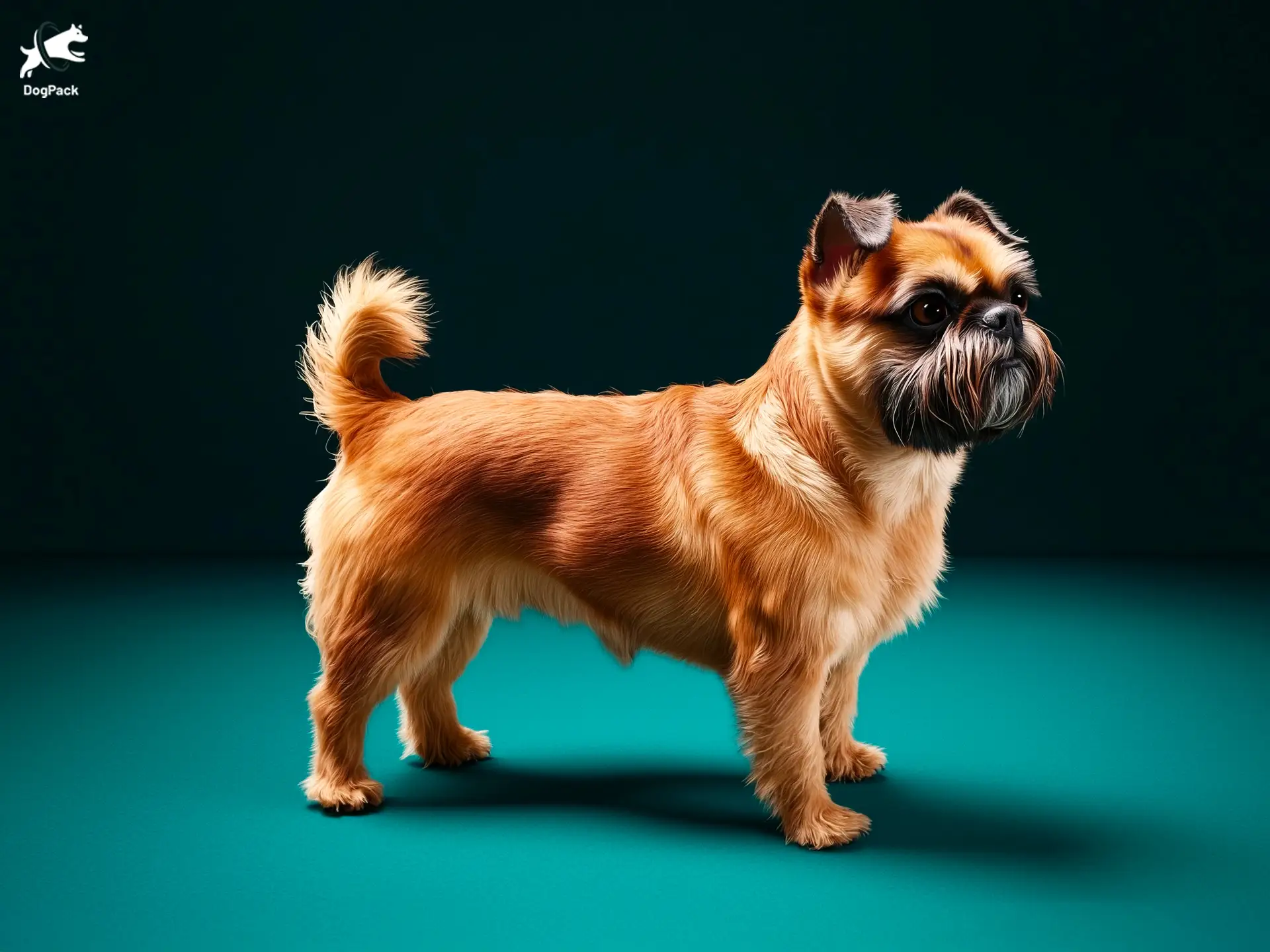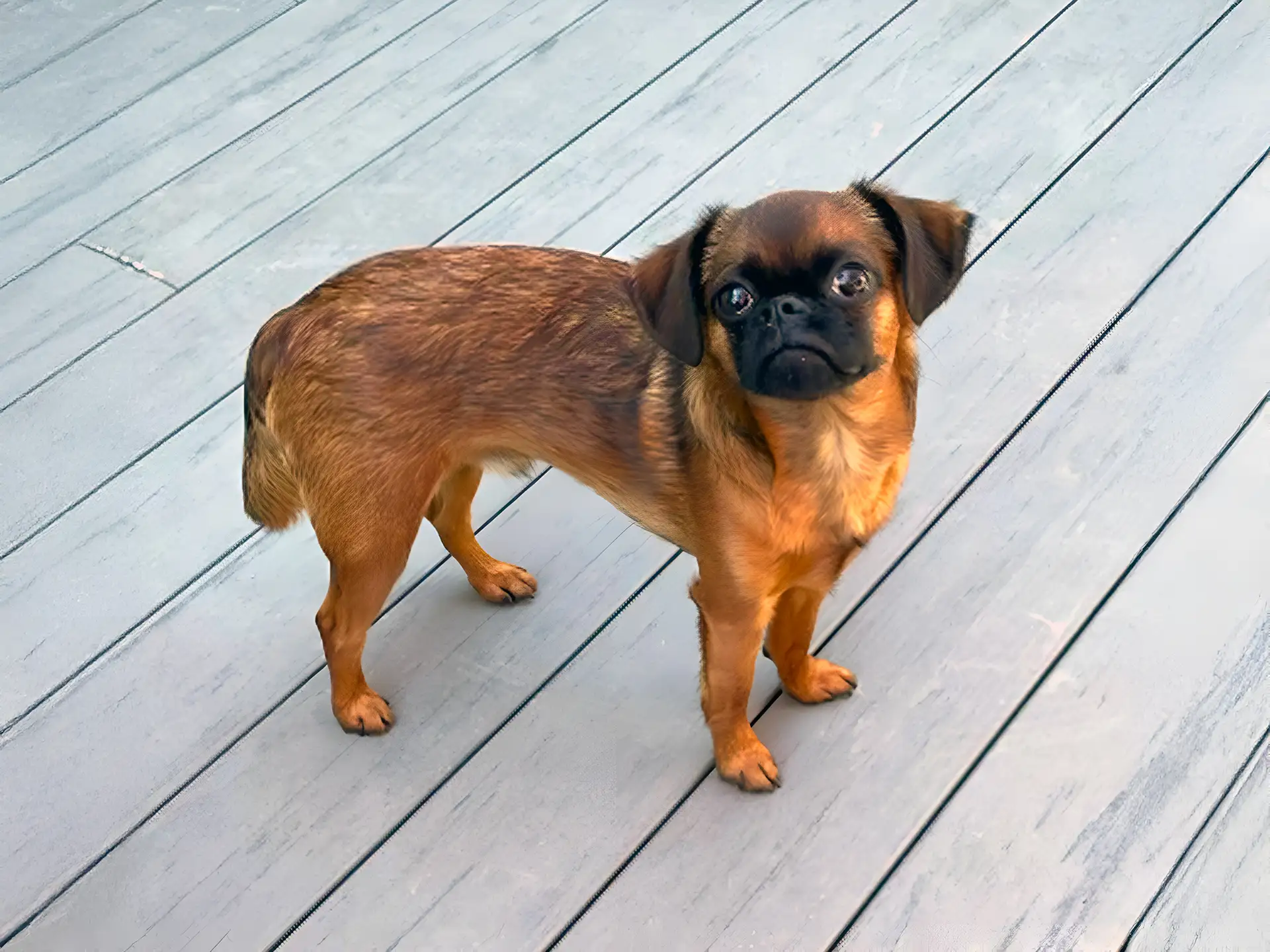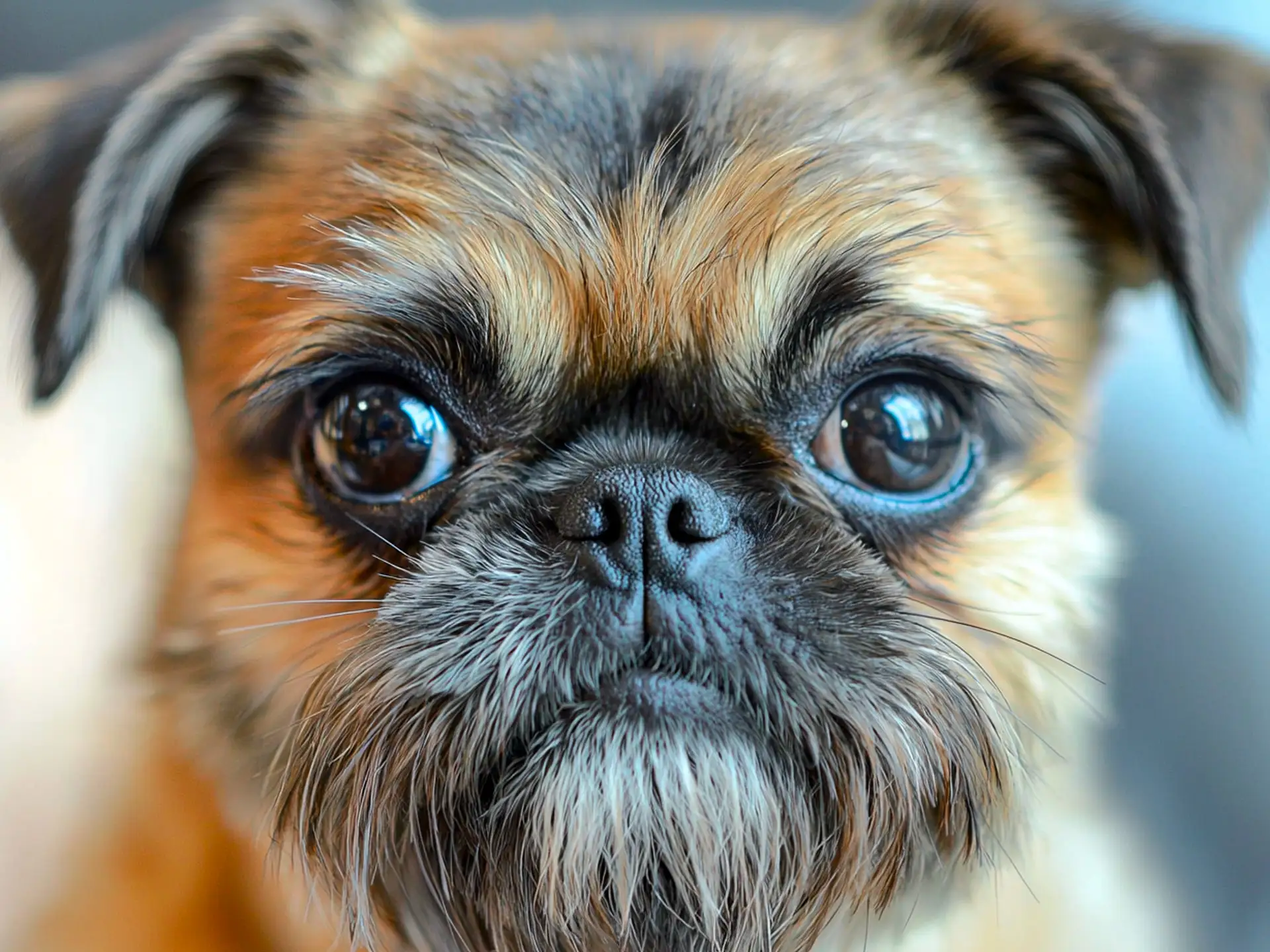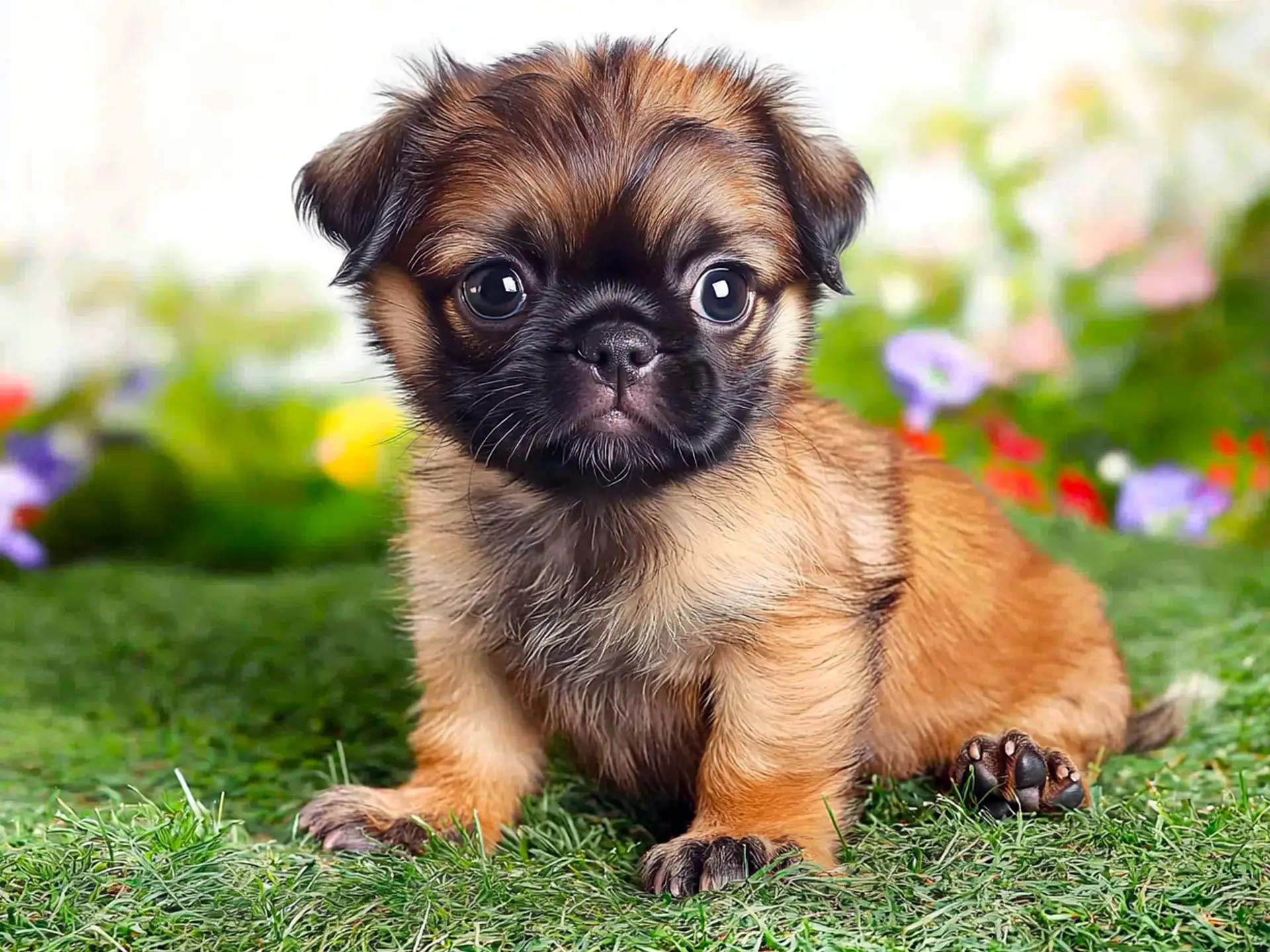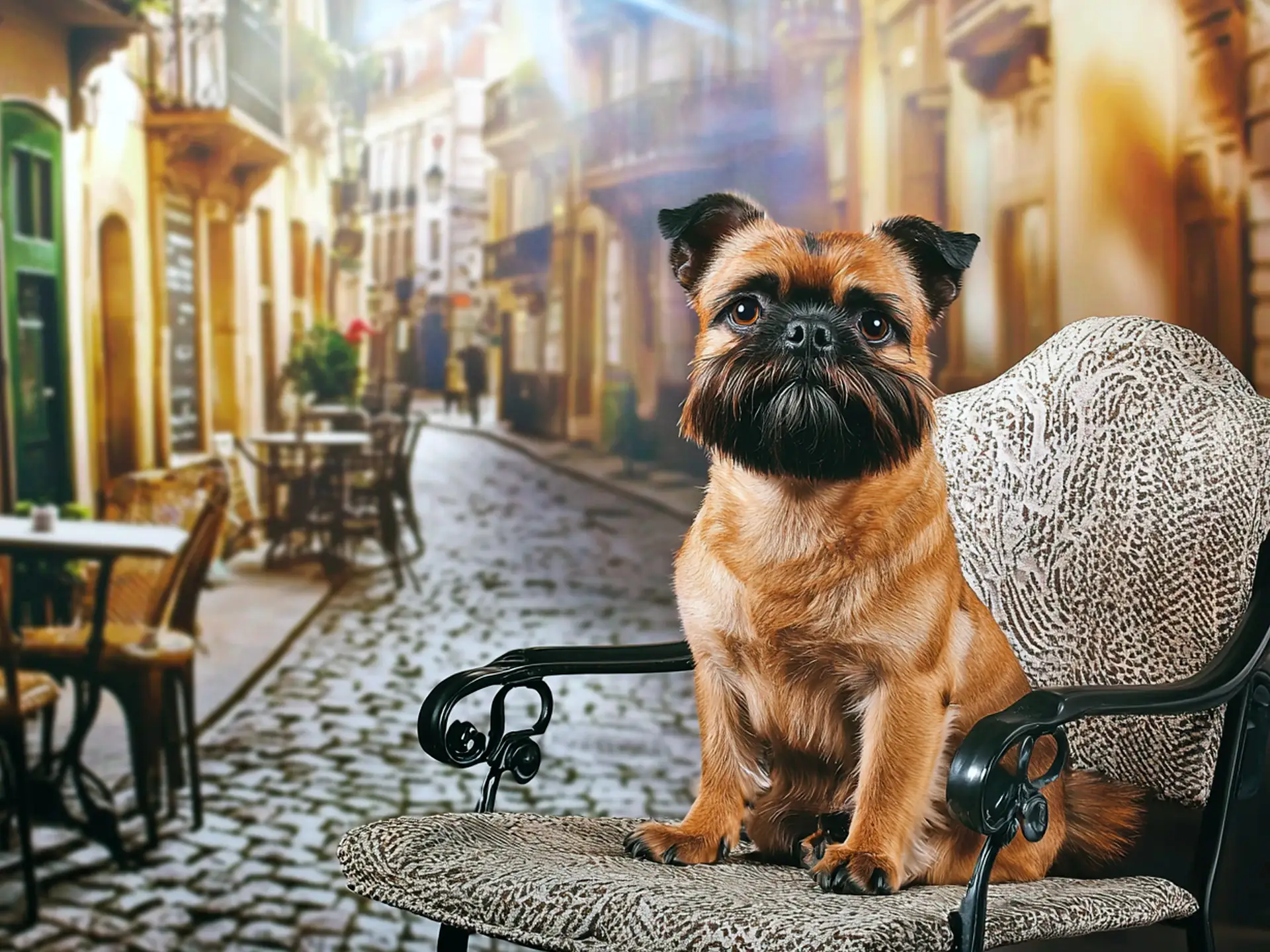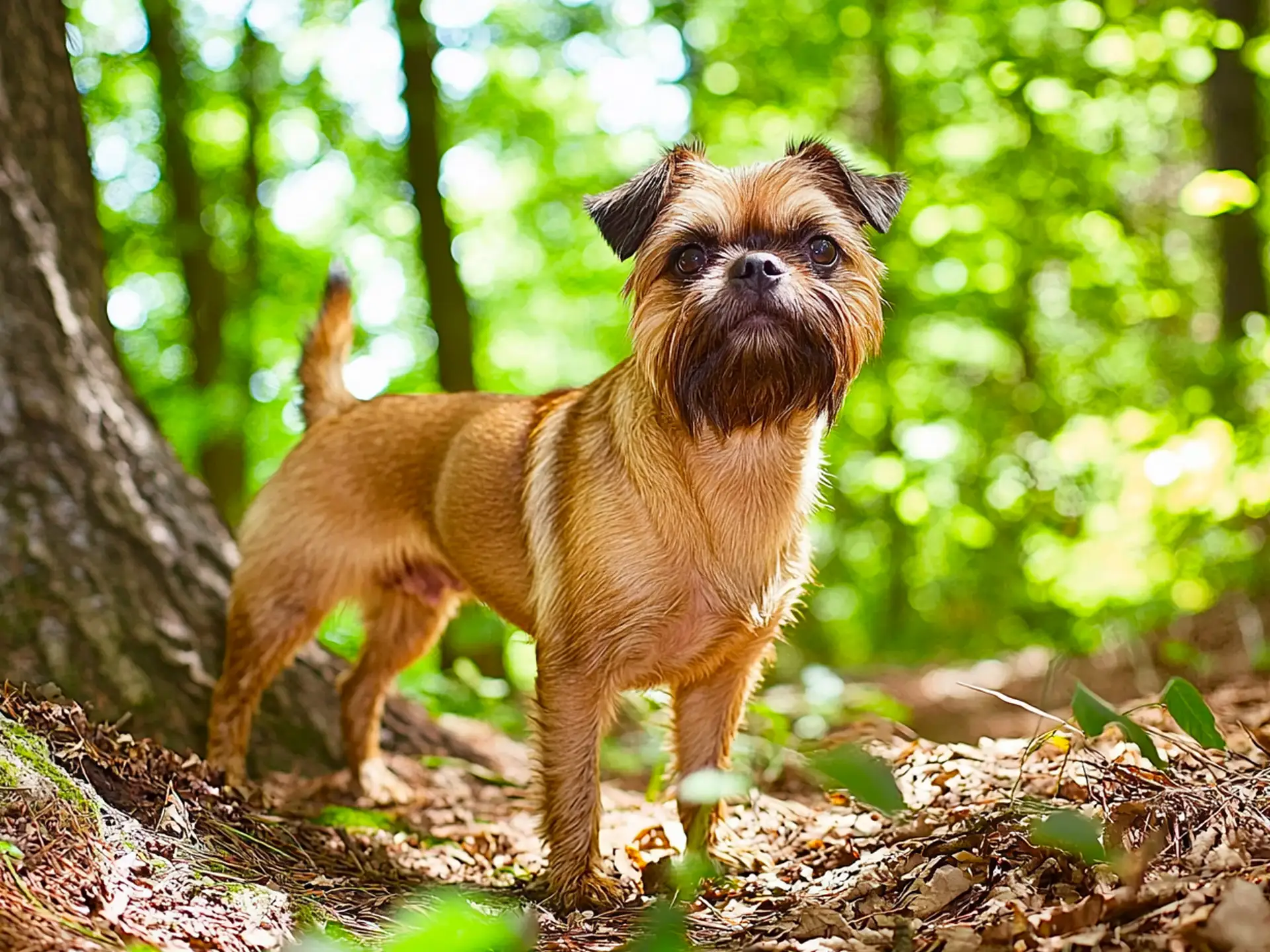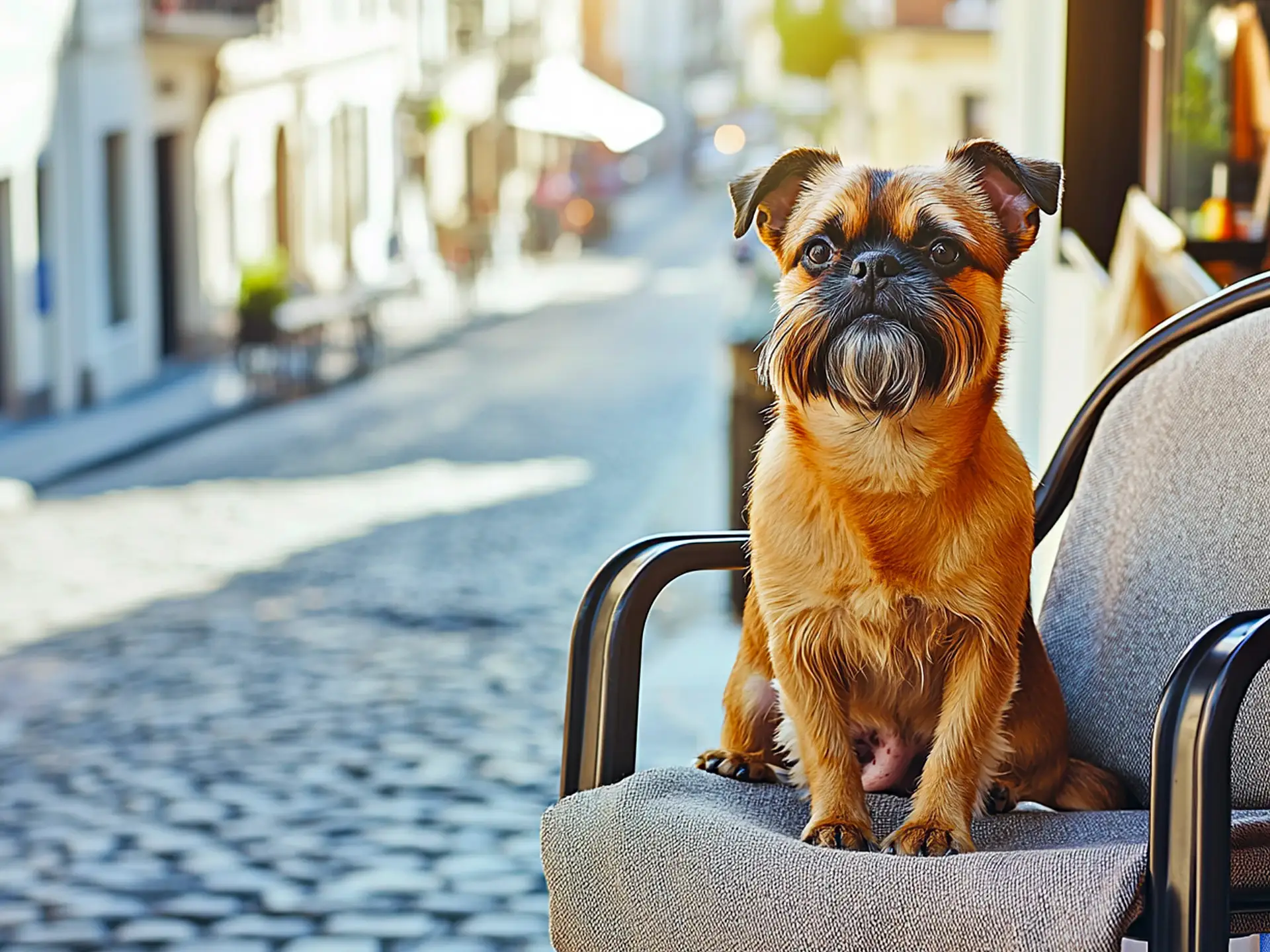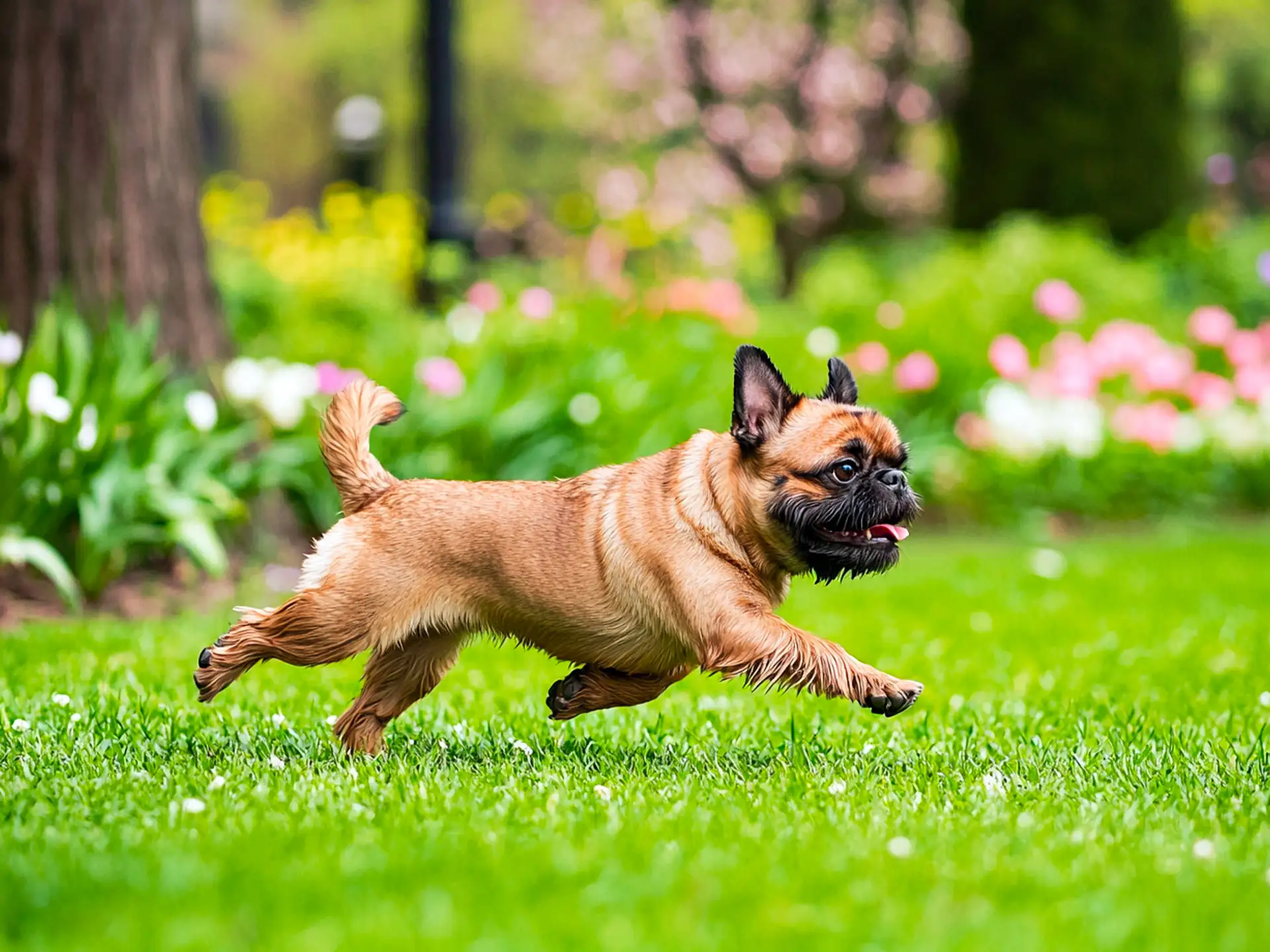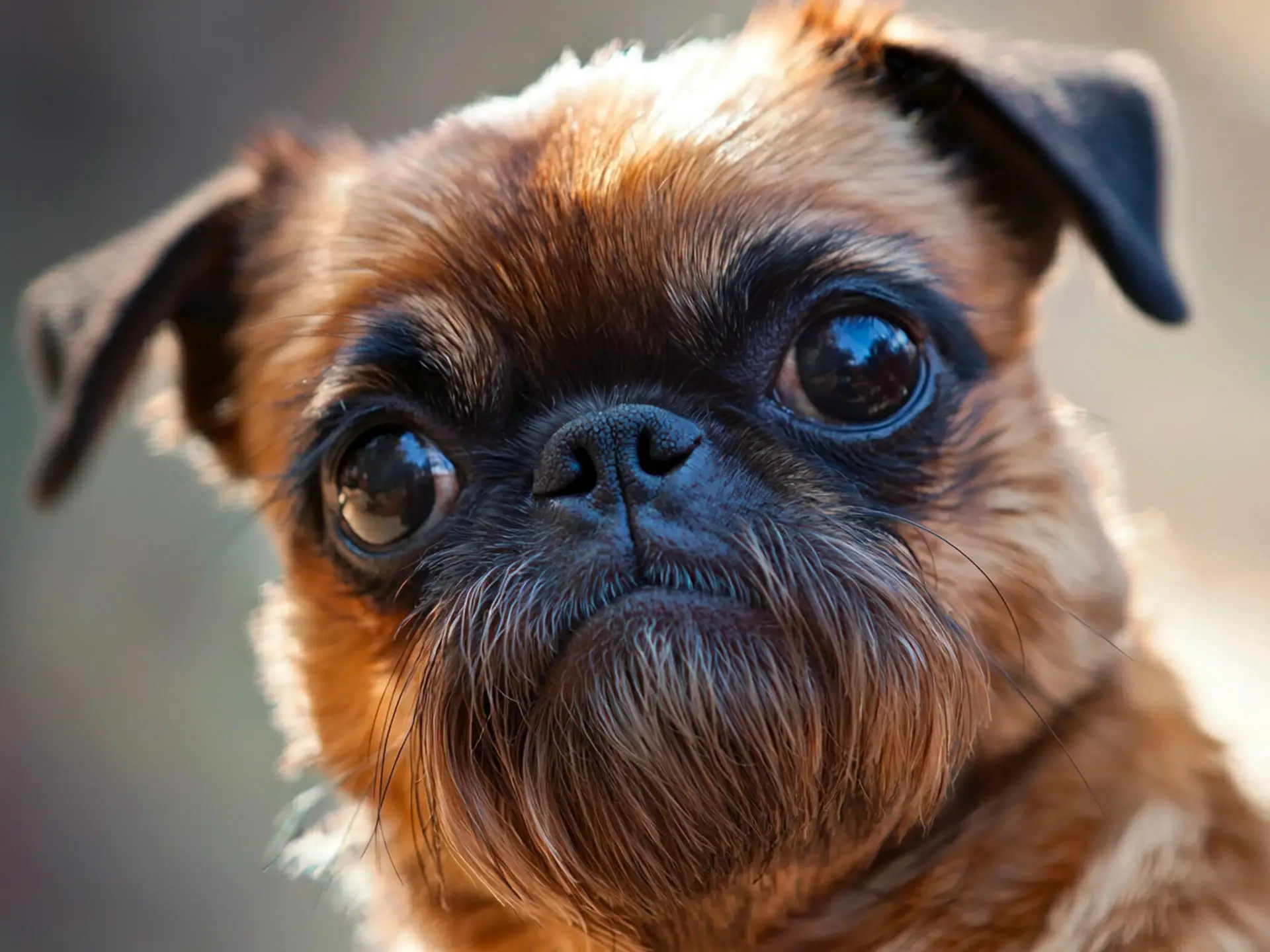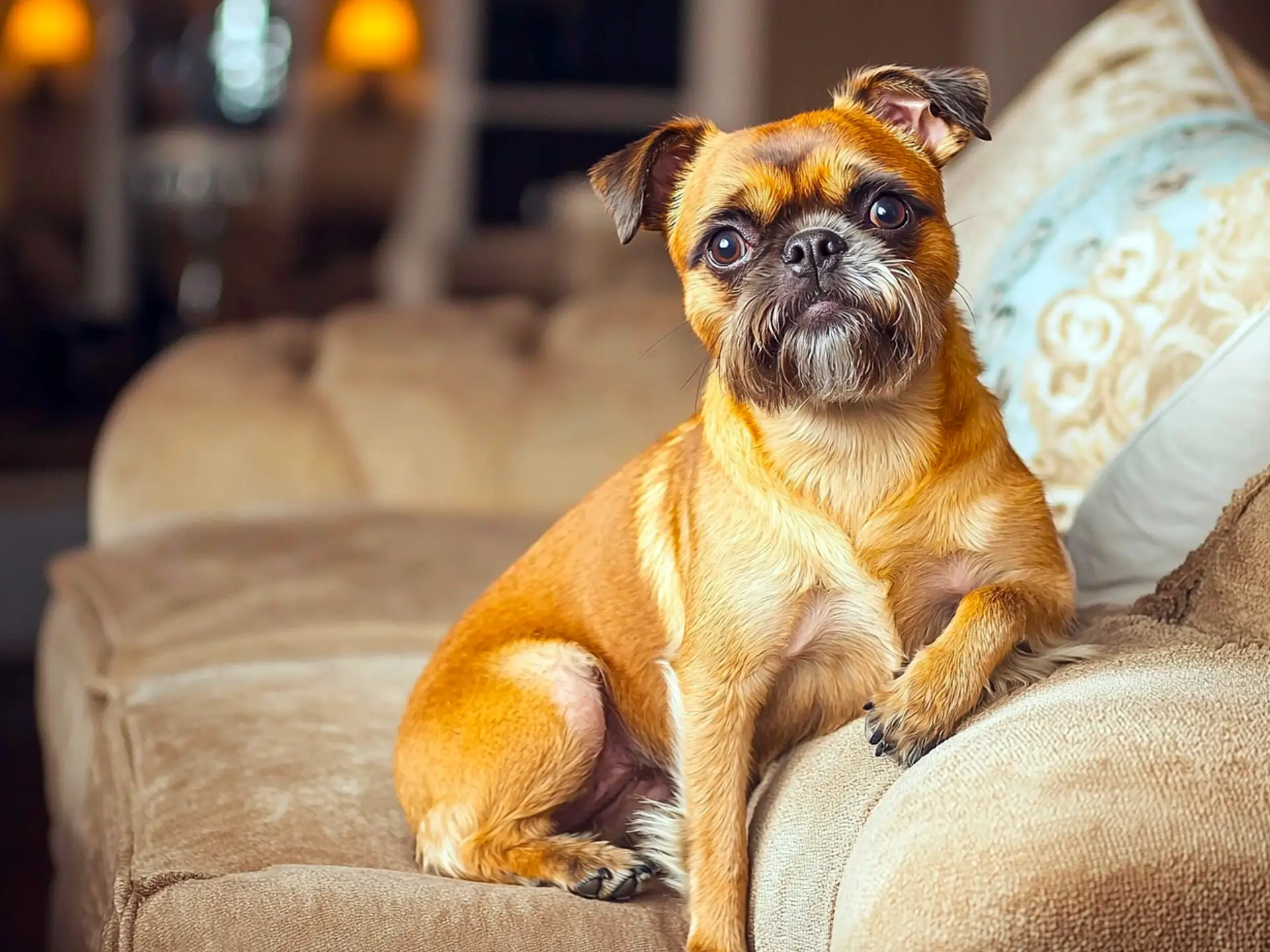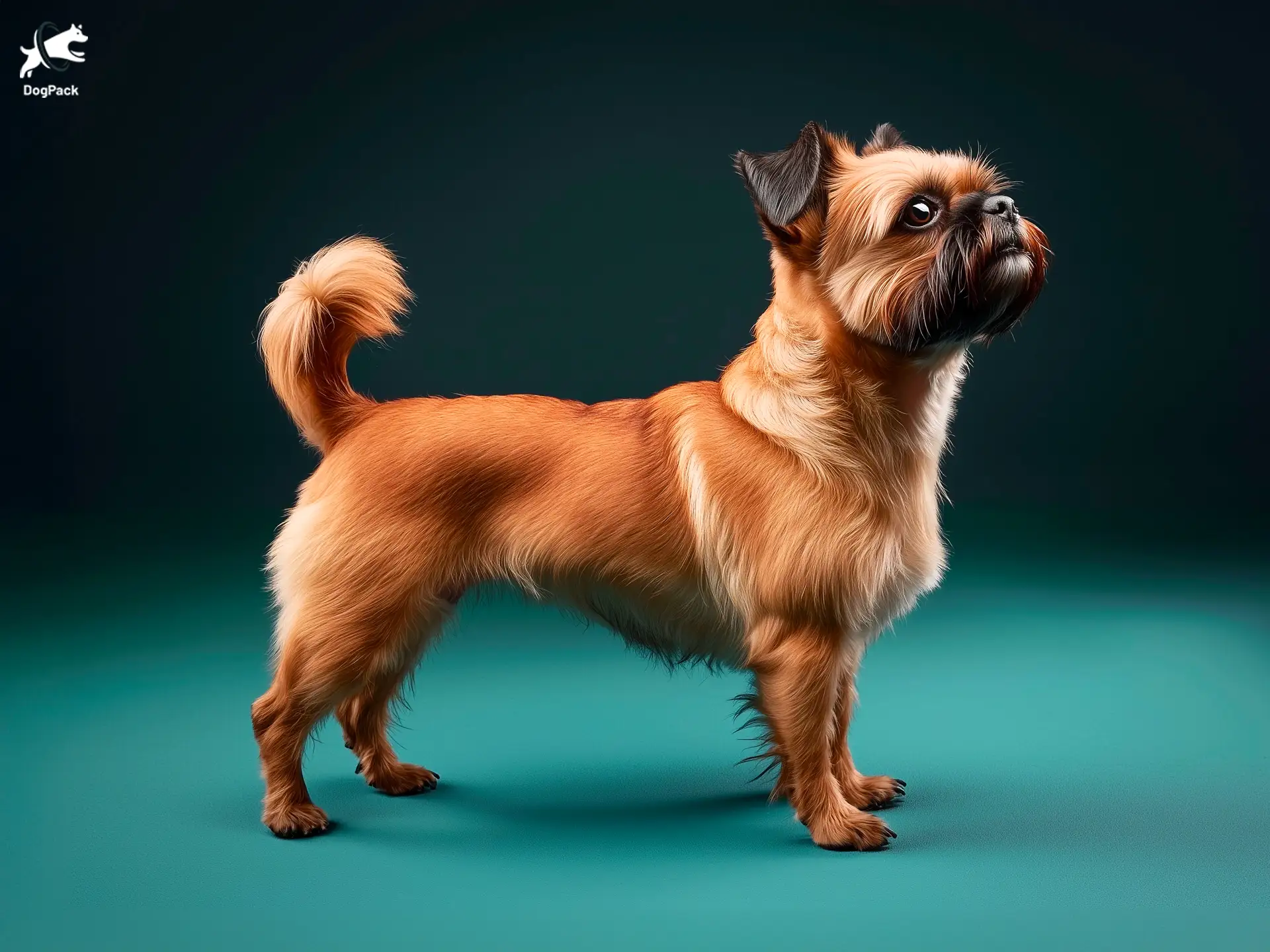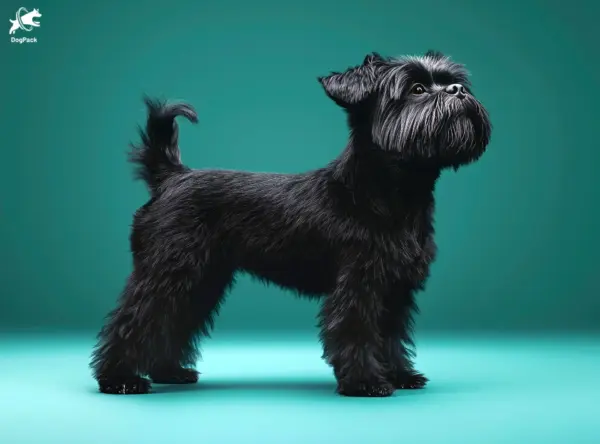Brussels Griffon Dog Breed Info & Overview
The Brussels Griffon is a small breed with a striking, expressive face that feels plucked from a Victorian painting. With its human-like expressions and affectionate personality, this unique dog is a delightful companion for those seeking loyalty and a bit of entertainment. Despite their small size, Brussels Griffons bring a big personality, making them memorable and lovable family members.
Characteristics
Pictures
Breed History
Believe it or not, the Brussels Griffon originated in Belgium, where they were initially bred to hunt and eliminate rodents in stables. Their history dates back to the 19th century when they were favored by coachmen for their rat-catching abilities.
Over time, these little dogs caught the eye of the Belgian elite, including Queen Marie Henriette, who became an enthusiast of the breed. This royal attention elevated the Brussels Griffon from a working dog to a companion animal, increasing its popularity.
The breed’s distinctive look comes from a mix of several breeds, including the Affenpinscher, the Pug, and the English Toy Spaniel. This unique combination gave the Brussels Griffon its signature expressive face and charming personality.
Temperament, Personality
The Brussels Griffon is known for its affectionate and sensitive nature. They form strong bonds with their owners and love to be the center of attention. These dogs are often described as “Velcro dogs” because they like to stick close to their favorite humans.
While they are generally friendly, Brussels Griffons can be a bit reserved around strangers. Early socialization is key to ensuring they grow into well-rounded adults. They get along well with other pets, especially if raised together from a young age.
The breed is intelligent and curious, always eager to explore their surroundings. However, they can also be somewhat stubborn, which adds to their quirky charm. Their expressive faces make it easy to read their moods, making interactions even more engaging.
Physical Characteristics
One look at the Brussels Griffon, and you’ll notice their almost human-like expressions. They have a sturdy, compact body covered in either a rough or smooth coat. Their large, dark eyes and fringed beard give them a distinctive, endearing appearance.
Standing at just 7–10 inches tall (18–25 cm) and weighing between 8–10 pounds (4–5 kg), they are truly a toy breed. Despite their small size, they carry themselves with confidence and a bit of swagger that’s hard to resist.
The breed comes in a variety of colors, including red, black and tan, and belge (a mix of red and black). Their coat type can influence grooming needs, but both varieties add to the Brussels Griffon’s overall appeal.
Health Issues
The Brussels Griffon is generally a healthy breed, but like all breeds, they are prone to certain health conditions. Common issues include hip dysplasia, patellar luxation, and eye problems like cataracts and progressive retinal atrophy.
Respiratory issues can also occur due to their short snouts, especially in hot or humid weather. Regular veterinary check-ups are essential to catch any potential problems early on. Maintaining a healthy weight can also alleviate stress on their joints and heart.
Dental hygiene is particularly important for this breed. Regular teeth brushing and dental check-ups can prevent periodontal disease, which is common in small dogs like the Brussels Griffon.
Grooming Needs
Grooming a Brussels Griffon depends on whether they have a smooth or rough coat. Smooth-coated Griffons require regular brushing to remove loose hairs and keep their coat shiny. A weekly once-over should suffice for these pups.
Rough-coated Griffons need a bit more attention. Their wiry hair requires brushing several times a week to prevent matting. Hand-stripping, a process of removing dead hair, is recommended a few times a year to maintain the coat’s texture.
Regardless of coat type, regular nail trimming, ear cleaning, and teeth brushing are important parts of their grooming routine. Their expressive faces may also need occasional wiping to keep them clean and healthy.
Exercise Requirements
While the Brussels Griffon is a small dog, they are surprisingly energetic. They enjoy daily walks and playtime to keep their minds and bodies active. About 30 minutes of exercise each day is usually enough to keep them content.
These dogs excel in agility and obedience training, which can be a fun way to bond and burn off energy. Interactive toys and puzzle games are also great for stimulating their intelligent minds.
Remember, the Brussels Griffon doesn’t tolerate extreme temperatures well. It’s best to avoid strenuous activities during very hot or cold weather, keeping exercise sessions moderate and comfortable.
Training Tips
Training a Brussels Griffon can be both rewarding and challenging. Their intelligence makes them quick learners, but their occasional stubbornness requires patience and consistency. Positive reinforcement methods work best with this sensitive breed.
Early socialization is crucial to help them become well-adjusted adults. Expose them to different people, environments, and other animals to build their confidence. This will help reduce any shyness or anxiety around new situations.
Crate training can be beneficial, providing them with a safe space of their own. Keep training sessions short and fun to maintain their interest, and always reward good behavior with treats or praise.
Nutrition, Diet
Feeding a Brussels Griffon requires attention to their specific dietary needs. High-quality dog food formulated for small breeds is recommended. Portion sizes should be appropriate for their weight and activity level, typically around 1/4 to 1/2 cup of food per day, divided into two meals.
These dogs can be prone to obesity, so monitoring their calorie intake is important. Avoid overfeeding and limit treats to prevent weight gain. Foods rich in omega-3 fatty acids can promote a healthy coat and skin.
Consult with your veterinarian to create a balanced diet plan tailored to your Brussels Griffon. Fresh water should always be available to keep them hydrated, especially after exercise.
Adoption, Breeders
If you’re considering adding a Brussels Griffon to your family, research is key. Reputable breeders can provide health clearances and detailed information about the puppy’s lineage. The American Brussels Griffon Association is a great resource for finding trusted breeders.
Adoption is another wonderful option. Rescue organizations specialize in rehoming Brussels Griffons in need of a loving home. Websites like Petfinder can help you locate adoptable dogs in your area.
Always avoid purchasing from puppy mills or pet stores that may support unethical breeding practices. Visiting the breeder or rescue facility in person can give you insight into the dog’s environment and care.
Family Pet?
The Brussels Griffon can make an excellent family pet for households that understand their needs. They thrive on companionship and are happiest when included in daily activities. Their small size makes them suitable for apartments, but they still enjoy playtime and interaction.
They generally get along well with older children who know how to handle small dogs gently. Supervision is recommended with younger kids to prevent accidental injuries. Their friendly nature extends to other pets, especially if socialized early.
Overall, the Brussels Griffon brings joy and laughter to a family setting with their quirky antics and loving disposition. They are loyal companions who quickly become cherished members of the household.
Right For You?
If you’re looking for a small dog with a big heart, the Brussels Griffon might be the perfect match. They are ideal for individuals or families who can provide plenty of attention and affection. Their adaptable nature suits apartment living, and their moderate exercise needs fit various lifestyles.
However, if you’re away from home frequently, this breed may not be the best choice. They can develop separation anxiety if left alone for long periods. Consider your ability to meet their social and emotional needs before bringing a Brussels Griffon into your life.
In the end, the Brussels Griffon offers endless companionship and entertainment. Their unique personality and expressive face make them a delightful addition to the right home.
Conclusion
The Brussels Griffon is a charming and affectionate breed that brings joy to any household. Their unique looks and spirited personality make them stand out in a crowd. Whether you’re a first-time dog owner or a seasoned pet parent, this little dog has a lot to offer.
Before making a decision, consider your lifestyle and ability to meet their needs. If you can provide love, attention, and a bit of humor, the Brussels Griffon could be your new best friend. They’re more than just a pet—they’re a loyal companion ready to share life’s adventures with you.
FAQs
-
Why are Brussels Griffons often compared to “Ewoks”?
Brussels Griffons are often compared to “Ewoks” due to their distinctive, expressive faces and large eyes, giving them a charmingly quirky appearance. Their rough-coated variety further enhances this resemblance.
-
Do Brussels Griffons require a lot of mental stimulation?
Yes, Brussels Griffons are intelligent and curious, benefiting from daily mental challenges. Puzzle toys, short training sessions, and interactive games help keep them engaged and prevent boredom-related behaviors.
-
How vocal are Brussels Griffons?
Brussels Griffons are known to be alert but not excessive barkers. They may bark to alert their owners to new people or sounds, but their vocalizations are usually manageable with proper training.
-
Can Brussels Griffons handle being left alone?
Brussels Griffons are affectionate and form strong bonds, so they may struggle with extended alone time. Gradual desensitization to being alone and providing engaging toys can help manage separation anxiety.
-
Are Brussels Griffons prone to any specific health issues?
Brussels Griffons can be prone to respiratory issues due to their short noses, as well as dental issues because of their small mouths. Regular vet check-ups and proper care are essential to monitor their health.
Breed Ratings
The Brussels Griffon is smart and quick to learn, although a bit of stubbornness can sometimes make training a fun challenge.
This breed loves to play and will keep you entertained with their quirky antics and energetic spirit.
With moderate energy, they enjoy daily activities but also appreciate cuddle time on the couch.
Low shedding makes grooming manageable, especially for the smooth-coated variety.
While they were once ratters, modern Brussels Griffons have a low prey drive but may chase small critters occasionally.
Grooming needs vary by coat type, with rough coats requiring more attention than smooth coats.
Their intelligence aids in training, but patience and positive reinforcement are key due to occasional stubbornness.
They prefer company and may experience separation anxiety if left alone for long periods.
They can be vocal, alerting you to strangers or expressing their excitement.
Minimal drooling makes them a tidy companion around the house.
Generally gets along well with other dogs, especially when socialized early.
A healthy breed with a few genetic concerns that can be managed with regular veterinary care.

